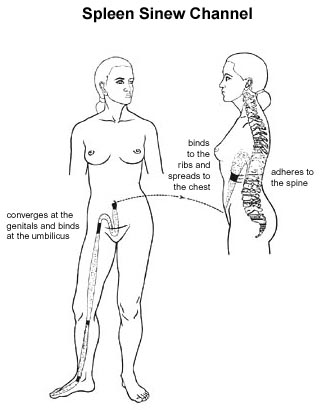 |
Tandem Point(SM) Therapy:
An integrated acupressure approach for myofascial pain by Rena K. Margulis Presented to Rehabilitation Medicine Grand Rounds National Institutes of Health March 17, 2000 |
|
The second category of channels most relevant to Tandem Point therapy is the 12 sinew channels or tendino-muscular meridians. Sinew channels
The iliopsoas lies deep to the Spleen primary channel and the Spleen sinew channel. Here is a drawing of the spleen sinew channel. When I first saw this drawing, I was amazed. Note the black areas in the drawing, at the medial ankle (Sp 5), medial knee (Sp 9), medial to the ASIS (Sp 12-13), and near the navel. These are "binding points" of the channel. The area near the navel is very close to one of Travell and Simons's points for the iliopsoas. The area medial to the ASIS is one of the best places to release a taut band in the iliopsoas. And the points near the knee and the ankle are points that I had found by trial and error to be among the best at releasing trigger points in the iliopsoas. Naturally, upon discovering this drawing, I started to use the fifth binding point on the channel, located on the rib cage.
|
